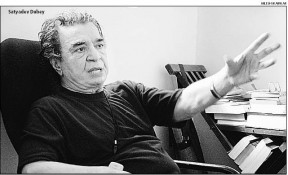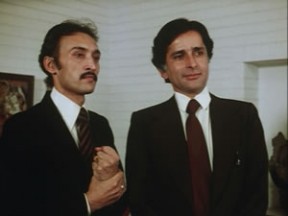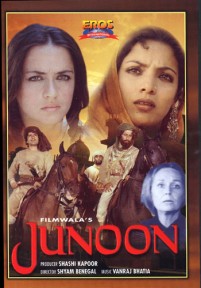“Iss daur se sabhi ko guzarna padta hai..himmat mat haar bete..shunya nahin zindagi saamne hai tumhare.. insani rakt ek hamesha behne wali Ganga hai..pusht dar pusht woh behti hai..tum jiyoge tabhi hamari jade jiyengi.. marusthal mein apni ma ke cactus ban jao..yaadon se apne ko seecho, maut ka dar kise nahin lagta par iss dar ke par jaane ka mauka zindagi mein ek baar zaroor aata hai.. dar mat.. chunav kar..zindagi ko chun, Vijeta ban, Mrityunjay ban..aane wale pal ke liye lad, uth bete, iss baar utha toh phir kabhi nahin girega aur tu uthega ye mera vishwas hai.. mera vishwas.”
(We all have to get through this. Don’t lose courage..before you is not a vacuum of nothingness but life…the human blood is an eternal river..it flows from generation to generation..if you live, our roots will live. In this never ending sandscape, become your mother’s cactus..drench your soul with memories..everyone fears death but atleast once in a lifetime, we get an opportunity to get past it. Don’t be afraid. Choose. Choose life. Be a winner. Be invincible. Fight for what is yet to come. Rise, son. If you rise now, you will never fall again and I believe, you will rise. I believe.)
I know Satyadev Dubey for this timeless life lesson that is my answer to every human struggle and my reference point for the renewal of spiritual resources. He wrote this brilliant passage as a dialogue in Govind Nihalani’s 1982 classic, Vijeta. A young Indian airforce pilot Angad Singh (Kunal Kapoor) is gasping for life after having crashed in a desert. His father (Shashi Kapoor) is battling for life elsewhere, in an ICU after having suffered a heart attack. Somehow, in a near death experience, he reaches out to his son and says the above lines.
There is no better example of what cinema can do for our spirit. I also know him for the fact that he helped steer the New Wave cinema in the 70’s and 80’s towards a zone Hindi cinema had never negotiated before. The zone of unsettling realism and unsanitised loss and pain and humanism that was was not cosmetic but came from the roots of the being. Humanity was not a club of the privileged in the screenplays and dialogues he penned for Shyam Benegal’s cinema. His cinematic language was unlike any we had heard before. It had no melodrama but great, searing power. He was a poet who said real things that sounded like poetry.
And he could also strip human communication of all verbosity and his screenplay and dialogue in 1974’s Ankur were about the politics of lust, power, oppression and finally an outburst of defiance with which Shabana Azmi arrived as a major talent in international cinema.
In Benegal’s 1975 film Nishant (where he also played a cameo), he layered Vijay Tendulkar’s story with a dialogue exuding unbearable tragedy, revulsion and grief as we watched the debasement of women in a village ruled by corrupt, powerful and lust driven feudal lords and as always there was the inevitable boiling point that Dubey knew how to contain and yet express without verbal excess. One of my all time favourite films is 1980’s Benegal masterpiece Kalyug, a contemporary take on Mahabharat where Dubey along with Girish Karnad stripped the veneer of aristocracy from business empires to show violence, deep rooted moral corruption and ugly family secrets.
The scene where Shashi Kapoor’s Karan confronts the Bheeshma Pitamah like character AK Hangal with the question, “Who am I?,” is one of the most moving moments in the film. As is the moment when he curls up in a foetal position on his bed and cries after being told that he is the unwanted, abandoned son of a mother who cannot stand by him in a family war where he will possibly be sacrificed first to bring peace. There was also Junoon (1978), a story of primal passion where Dubey’s dialogue brought Ruskin Bond’s story to life with the clang of British and Mughal idioms, deep abiding compassion and as always exemplary restraint.
Mandi. Bhumika. His brilliance and his ability to express the soul of diverse narratives never faltered. And it is our loss that we never really knew the extent of his talent to respect it more in mainstream cinema. Maybe he was bigger than what our acknowledgement could have given him though he was awarded the Sangeet Natak Akademi award in 1971, won the National Award for Best Screenplay for Bhumika and the Filmfare Best Dialogue Award for Junoon. This year, he was honoured with the Padma Bhushan but he lived his convictions and his work without seeking fame, adulation, money.
He mentored legions of actors along the way, giving Indian theater, a spunk, a sense of independence and self-worth, directing and producing plays of giants like Girish Karnad, Badal Sarkar, Vijay Tendulkar, Mohan Rakesh, Dharamveer Bharti, Chadrashekara Kambara and counting. He was truly a resilient cactus that grew stubbornly in a space where cliches rule. He was truly a Mrityunjay, the man who conquered the death of creativity by working with material without which Indian stage and cinema would never have known what it is to be truly fearless.
Though Satyadev Dubey passed away today, his legacy will outlive not just him but us. And everything that is created without integrity, commitment and passion.
Reema Moudgil is the author of Perfect Eight (http://www.flipkart.com/b/books/perfect-eight-reema-moudgil-book-9380032870?affid=unboxedwri )











